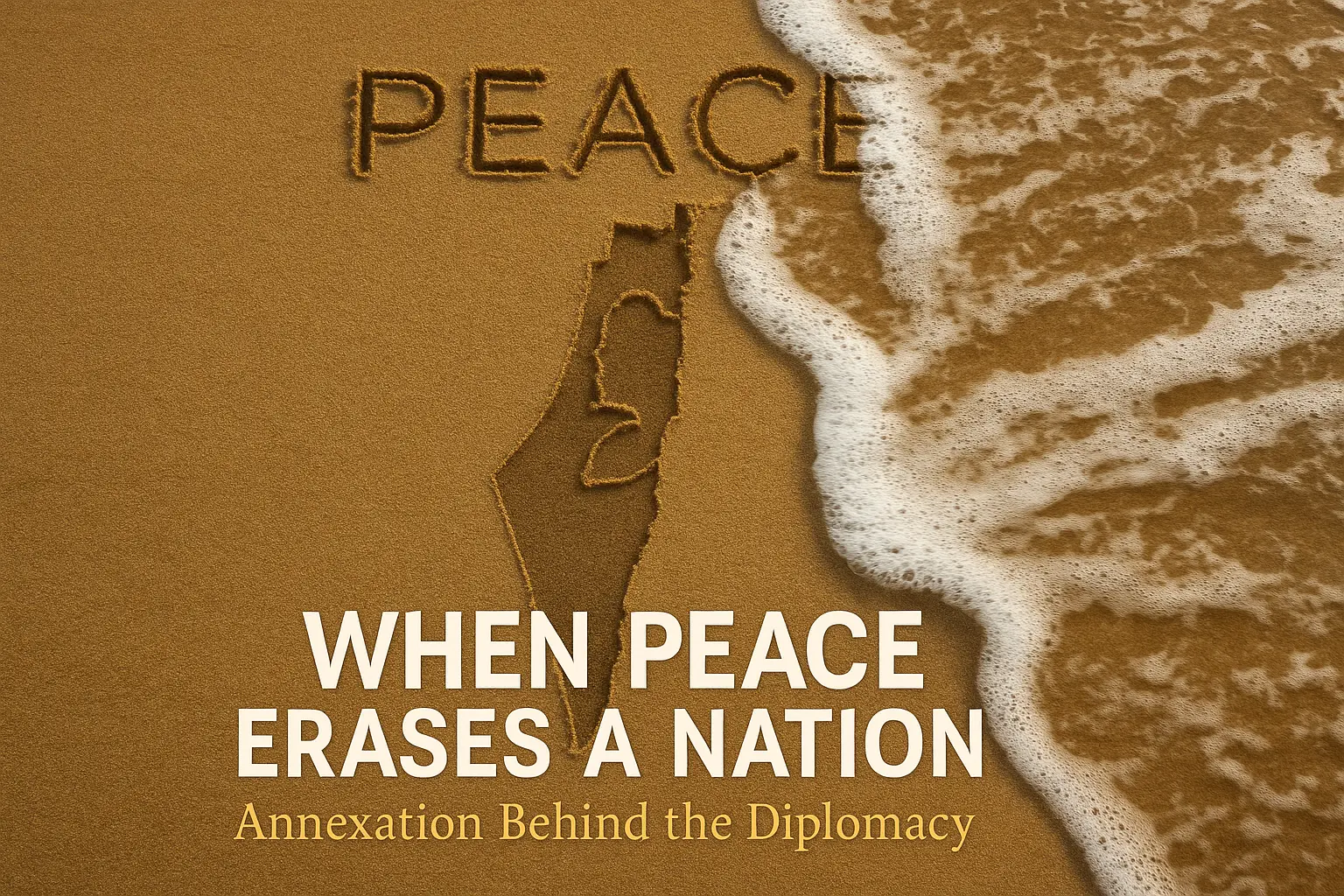Introduction
On the stage of
international diplomacy, the recent “peace deal” — heralded by key players with cameras flashing and headlines proclaiming a new dawn — may look like hope in motion. But beneath that glare of optimism lies a far more calculated narrative: one turned not toward justice, but consolidation.
The rush to celebrate glosses over a darker truth: a legal and
political strategy is unfolding, one that seeks to rewrite the map of Palestine under the guise of a peace process. The recent vote in the Knesset (Israel’s parliament) is not a side-show; it is the next act in a long-running drama of dispossession. Every applause, every handshake, supports not liberation but absorption — a grim reality overshadowed by jubilant rhetoric.
1. The Script: Diplomacy as Theatre
We’ve seen this play before. A peace pact is brokered, pictures taken, world leaders “join hands” around the table. In this case, the U.S.-brokered blueprint for Gaza was the opening scene. The cameras captured smiles; the narrative touted relief, truce, even hope.
But where was the lead actor? Benjamin Netanyahu’s conspicuous absence from the pact-signing ceremony spoke volumes: this was not about his direct endorsement of the terms, but about maintaining flexibility downstream. His absence allowed him to dodge accountability while the performance proceeded.
Shortly thereafter, the Knesset quietly advanced a bill to impose Israeli sovereignty over the occupied West Bank — a move tantamount to annexation. (Al Jazeera, Oct 22 2025) It all adds up to a carefully choreographed drama: present peace, while preparing land grab. The pact provides the cover; the law delivers the act.
2. The Truth Beneath the Applause
The “peace plan” was sold as relief — a meaning-shift away from war and toward stability. But this relief is hollow without genuine self-determination. Meanwhile, the annexation bill isn’t a step toward coexistence; it is the legal codification of control.
The Knesset vote, 25 to 24, was the first of four readings to transform the bill into full law. Many Israeli members abstained or walked away — highlighting that it wasn’t full government backing, but the right wing’s play.
From the Palestinian perspective, the move is not progress — it is erasure. The annexation of land Palestine intends for a state, the expansion of settlements, and the sub-jugation of Palestinian governance all reflected in this bill. As one legal analyst summarized: “It is about formalisation of what’s already happening on the ground.” The illusion of peace then becomes the mechanism of subjugation.
3. The Supporters’ Morality Under Question
Behind the celebratory banners are backers: countries that endorsed the peace blueprint, offered political cover, promised backing for reconstruction, normalization, or aid. But here lies the ethical fissure: by endorsing a deal that paved the way for annexation, they become complicit in a process of dispossession.
Donald Trump claimed the peace plan had broad backing and insisted that annexation would not be permitted — yet the annexation bill passed its first reading anyway, exposing a disconnect between rhetoric and reality. (Reuters, Oct 23 2025)
If countries celebrate a deal that directly leads into legal annexation of occupied land, they cannot disclaim responsibility. Their support may look like diplomacy — but the effect is entrenchment of occupation.
Let there be no illusions: alliances built on neglect of justice will bear moral consequence. If the applause is for a “peace framework” that extinguishes one side’s rights while branding the act as progress — then the curtain reveals not peace but the spectacle of injustice.
4. The Drama of Relief — and the Calm Before the Storm
For Palestinians, the narrative offers temporary quiet, humanitarian relief, even optimism. Many celebrate the cease-fire, the promise of reconstruction, the idea of a new chapter. But true relief is more than a pause in violence; it is autonomy, rights, sovereignty. Without those, relief serves as sedation.
This “calm” is part of the script. While eyes are fixed on Gaza, the West Bank is being legislated away. Settlements expand, laws pass, governance structures shift. The dance of diplomacy distracts; the annexation advances.
The relief, in other words, becomes the lull before the deeper takeover.
5. Why It Matters — For Palestinians, for the Region, for the World
•For Palestinians, the stakes are existential: every inch of land formalised into others’ sovereignty is a blow to the possibility of their own statehood.
•For the region, supporting this drama threatens the very architecture of peace: agreements that normalize occupation undermine trust and fuel resentment.
•For the world, the precedent matters: when diplomacy becomes a cover for lawless annexation, it weakens international norms, erodes the legitimacy of treaty-making, and deepens injustice.
Moreover, the moral line is blurred. Those who cheer the deal must answer whether they endorsed relief — or resignation. Whether they supported peace — or helped script a takeover.
Conclusion: Truth Beyond the Curtain
The actors have entered, the lights are up, the cameras are rolling. The script is familiar: a peace pact is announced, celebration ensues, and the land shifts beneath the applause. But this is not peace — it is power dressed as generosity.
What looked like a relief for war-weary populations is turning into legislation for control. The world must ask: did we witness the promise of justice, or the staging of a takeover?
Countries that backed the pact bear responsibility — because one cannot cheer a blueprint for peace when it conceals a mechanism for dispossession. Diplomacy without equity is not progress. Silence in the face of coercion is not neutrality; it is consent.
The truth must now break through the drama: this “peace” is not the return of sovereignty for the oppressed — it is a maneuver to extinguish it. And when the applause fades, the standing legacy will not be restored dignity but annexed land.
The curtain will fall — and history will remember who applauded, who watched, and who stood by as justice was negotiated away.


